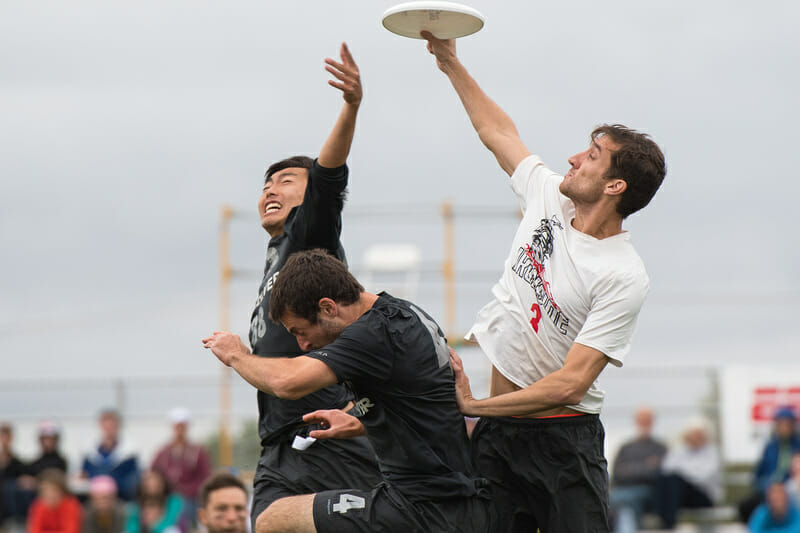Ultimate offers intensity unblemished by hate. Let's keep it that way.
October 13, 2016 by Guest Author in Opinion with 1 comments

This article was written by guest author Grant Lindsley.
It’s been ten years since I started playing club ultimate, and I’m playing in my first finals. I’m on San Francisco Revolver, our opponent is Boston Ironside, and I hate Kurt Gibson. I imagine saying on camera, should I get interviewed, that he is a salty baby. I imagine saying it nonchalantly, which only shows how “chalant” I actually feel.
We lose by one point and find ourselves, six hours later, showered, wearing jeans and non-capilene shirts, sitting in a hotel room in Chicago to spend a final night with the team.
Quiet is all I want to be. But something about a shower and increasing distance from the game earlier that day nudges me to sociability. I text a few friends on Boston to say congrats. Not Kurt Gibson, though. I hate that dude. And I don’t have his number.
They text me back and wonder what our plan is for the night. I dodge. I know I don’t want to spend the night hanging around Boston as they celebrate their victory.
Someone in the hotel room yells that Ubers are arriving, and we are whisked to a Chicago bar. We are the first there, and my introspective mood pushes me to an elevated seat in a corner away from the filling bar and dance floor. Uninterested in alcohol, I drink water, sit with teammates, and watch other teams arrive.
Then Boston arrives. Then Kurt arrives, and I feel my fragile mellow severely harshed. Hate that guy. Can’t look his way without getting pissed.
Part of me knows that I, not Kurt, am responsible for my bitter feeling. Kurt is who he is, and I control my response to him. But I want nothing to do with him, and I can’t stop the feeling.
But I can dance. And dance I do, if only to remove him from my field of vision. Some friends I texted on Boston are there. I hug Christian Foster, match Cricket’s charismatic eye twinkle, and go in for a hug to Russell Wallack, who is so drenched in sweat that now I am, too.
Talking with them, sharing their revel in that elusive and fleeting championship elation, hatches an expansiveness in me. A bird’s eye view over this dance club in Chicago shows hundreds of athletes, opponents, from across the nation, mingling and dancing.
Then Kurt steps onto the dance floor, and my jaundice returns. However, I find myself walking towards him, smiling at him, and telling him congrats. We chat. We chuckle. I compliment his contributions to Boston. He returns the praise. We talk about our jobs outside of frisbee. We drift away into other dancing circles, and the expansiveness remains.
It turns out that there are very few people in this sport whom I dislike. The more people I meet, the more true this is. Familiarity breeds fondness. Kurt is who he is, and he’s a nice guy.
Am I still replaying portions of the final game in my head, wishing I could have cut harder under, visualizing myself running down a tipped huck? Of course. But the resentments dissolved right there on the dance floor, and I knew I’d been graced with a reminder of why this sport is the best. The bird’s eye, seeing community above divisions, gained focus. In what other sport can you have the opportunity to celebrate with a rival after a championship game?
The tournament party is a pillar of our sport, especially at the elite level. Akira Yamaguchi planned the party and he did a service to us all.
Our sport offers the rare experience of intensity unblemished by hate. Often the two are wrapped up. There is a culture of cross-pollination, an international hospitality, a penchant for pranks, an object that flies unlike any other, and a neon-outdoorsy fashion aesthetic, yet ultimately only one reason why this offer continually extends to us as players: self-officiation.
The offer–here, play this game but also watch over it–is an act of trust. Everyone, not just the noble among us, everyone who plays this game is in a context that encourages them towards trustworthiness. That’s why there aren’t fights at the parties after Nationals, why players moving to a new city have an immediate network, why people keep playing into their forties.
In the midst of flowering visibility with ESPN contracts and new branches of professional leagues, let’s keep watering our roots.